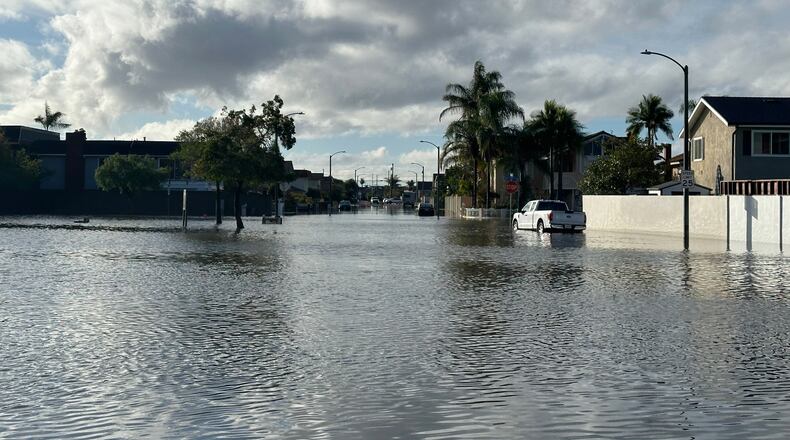LOS ANGELES (AP) — The third storm in just over a week drenched Southern California on Friday and prompted some local flooding but caused no major widespread damage before heading east into the mountains and south toward Mexico’s Baja California Peninsula.
The series of storms put Southern California on track for near-record November rainfall, the National Weather Service said. The region has received copious amounts of rain since Nov. 13, more than four times the normal amount that typically falls during the month in downtown Los Angeles, according to weather service reports.
Residents were warned before dawn Friday of flash flooding of streets, creeks and streams and possible mudslides in parts of Los Angeles and Orange counties. Some vehicles were stuck in floodwaters near Culver City before dawn, the weather service reported.
In coastal Huntington Beach, rainwater rushed through streets like a stream, and one neighborhood flooded after a local pond overflowed, spilling water into the streets and trapping parked cars.
By midday Friday, there was a mix of clouds and sun along the coast as the storm moved east over the mountains, dropping about 3 inches (7.6 centimeters) of snow in the resort community of Big Bear with the potential for more into Saturday, said Sebastian Westerink, a meteorologist for the National Weather Service in San Diego.
“It is certainly possible we’re going to see a few inches overnight,” Westerink said.
No major damage was reported from the latest storm, Westerink said.
The rain was welcomed in a state prone to periods of drought and that relies on precipitation each winter for water as the weather warms into the spring. Since October, California has received much more rainfall than usual, pushing major reservoir levels higher, state water officials said.
In a normal November, downtown Los Angeles typically gets 0.78 of an inch (2 centimeters) of rain, but has already seen about 3.5 inches (8.9 centimeters) this month.
Santa Barbara County also has been a magnet for the moisture. Parts of the Santa Ynez Mountains have seen more than 15 inches (38 centimeters) of rain this month, the weather service said.
A potent atmospheric river is blamed for causing at least a half-dozen deaths earlier this month as it rolled across much of the state. Heavy rains also bring the threat of mudslides in areas that were recently ravaged by wildfire.
Atmospheric rivers are long and relatively narrow bands of water vapor that form over an ocean and flow through the sky, transporting much of the moisture from the tropics to northern latitudes.
Keep Reading
The Latest
Featured



